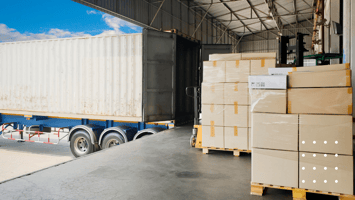Customs clearance is the most important process in global trade. If you are shipping goods between...
The Differences Between Freight Forwarders and Customs Brokers—Explained
International trade is a complex process. Importing and exporting goods involves customs-related duties, taxes, and other costs that can be huge if not handled properly. For any business moving goods through international markets, knowing the requirements and regulations associated with the trade is essential. Freight forwarders and customs brokers are at the heart of shipping internationally. Though the two have similarities, it is important to know the difference between a freight forwarder and customs broker, in order to best utilize your resources.
.png?width=1200&height=400&name=Ivory%20Elegant%20Summer%20Fashion%20Blog%20Banner%20(11).png)
Freight Forwarders
The transport of commercial goods can be a complicated process, involving careful logistic coordination. A freight forwarder would be the individual or entity which comes in to handle the transport of shipments, on behalf of their clients, who are usually shippers. The freight forwarder would work to arrange transportation of goods via the best method, be it air, rail, sea or land, and handle the logistic components. Some forwarders can also include additional services such as customs entry clearance, port charges, insurance costs, or trade documentation. However, their primary purpose is to facilitate a smooth shipping. The freight forwarder negotiates on behalf of the shipper with select transportation companies, in order to move freight. Some other services freight forwarders may offer include:
- Freight Consolidation
- Booking Cargo Space
- Preparing Shipping Documentation
- Negotiating Freight Rates
Customs Brokers
A customs broker is the individual or entity who is in charge of clearing goods through customs and acting as an intermediary between their client and the relevant government agencies in the process. Their role is to submit necessary documentation and make payments of taxes/duties to customs, on the clients behalf. A customs broker would understand what is needed to complete an accurate Canada customs invoice, US customs invoice, and how to calculate duties or fees on a specific shipment. Brokers need to maintain knowledge of up to date regulation and admissibility criteria, in order to fulfill their role. Issues of customs bonds, valuation, entry process, classification of goods, audits or duties/taxes, would be the area of expertise for brokers.
In order to simplify the process, and complete an invoice correctly the first time, you can use the Zipments.io Invoice form generator. U.S. and Canada customs invoices are filled out in minutes, and the form will automatically use AI technology to generate relevant tariff codes and ensure accuracy of your invoice.
The Difference Between Customs Brokers and Freight Forwarders
While they both do work similarly as the intermediary for the client, and sometimes they even work with one another; customs brokers and freight forwarders are focused on different components of freight shipping. Usually, brokers focus on import aspects of freight shipping while freight forwarders focus on the export aspects. Their differences can be summed up in a few categories:
- Responsibilities/Roles
- Business Focus
- Cost Effectiveness
Freight forwarders are a bit more broad in terms of their responsibility, while customs brokers have a specific task at hand. Customs brokers are concerned with ensuring goods clear customs, which means their priority and main focus is to ensure compliance and clearance. However, freight forwarders are focused on the physical movement of freight from point A to point B, so the documentation and regulation adherence components apply to them due to the need to move freight in an efficient manner.
Financially, the two have a different focus, where brokers work to prevent additional customs fees or difficulties with duties/taxes, while freight forwarders help find the most cost effective shipping methods for goods.
Perhaps the biggest difference between a freight forwarder and customs broker is who they connect with, on behalf of the client. Customs brokers work primarily with government agencies in order to clear the goods for their client, while freight forwarders work with transportation companies to arrange movement of goods. Sometimes brokers will work with transportation providers as well, but freight forwarders usually stick to their area of expertise and ensuring the shipping process runs smoothly, unless otherwise specified. When working with a freight forwarder, it is important to inquire into whether they provide customs clearance services or not, as some freight forwarders can also provide customs brokerage services.
.png?width=1200&height=400&name=Ivory%20Elegant%20Summer%20Fashion%20Blog%20Banner%20(9).png)
How Freight Forwarders Can Benefit Customs Clearance
While they may not always deal with customs clearance directly, freight forwarders can contribute to the customs clearance process and help simplify matters. Some ways in which freight forwarders can work to improve or simplify customs clearance includes:
- Logistics: A freight forwarder can ensure that all components of the logistics of a shipment are covered, so that no delays or disruptions occur. They can handle matters of port charges, insurance costs and tracking to help ensure a smooth trip. They also arrange for the best transportation method in accordance to the goods and location they are heading to.
- Paperwork: Shipments come with a lot of document requirements, and the freight forwarder can help compile the necessary paperwork such as bill of lading, customs invoice or port documents, in order to simplify the process.
- Cargo Space: Freight forwarders can help ensure that appropriate containers are used for transport and book necessary cargo space. Incorrect packing can lead to delay at customs, so a freight forwarder can avoid disruption by ensuring cargo is loaded properly and that appropriate shipping containers are used.
When Do You Use Freight Forwarders vs. Customs Brokers?
Freight forwarders and customs brokers work together to help you get goods to the right people, and in the right place. In order to determine when to use a freight forwarder, it is important to consider business needs. For quick and affordable shipping means, a freight forwarder may be able to provide a useful service. Logistics wise it is cost effective to use a freight forwarder when shipping for the first time or if you are unclear of the best routes for your shipment.
When you are shipping for the first time or you are too busy to keep up with governmental rules and regulations, it may also be beneficial to seek out a customs broker, especially if you are not familiar with CBSA (Canada Border Services Agency) or CBP (U.S. Customs and Border Protection) regulations. If you want to worry less about documentation and regulation changes, then a customs broker may be a beneficial option.
Whether you are exporting or importing, the logistics are important. Logistics include getting the necessary documents in order, working with freight forwarders, customs brokers, and more. The choice of services between a freight forwarder and customs broker will be dependent on business needs. Ideally, one of the best ways to save money on your shipments is to plan ahead and know what you are getting into. There is no one-size fits all solution, so account for your needs and make an informed decision based on research and careful planning.

-2.png?height=200&name=Brown%20Simple%20Tips%20Shoot%20Blog%20Banner%20(2)-2.png)

.jpg?height=200&name=Blue%20Illustrated%20Dots%20Hosting%20Provider%20Presentation%20(13).jpg)